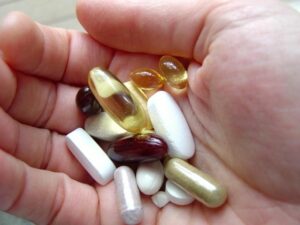PCOS is a common disorder that can make it difficult to lose weight. However, with the right approach, you can shed those extra pounds and feel better than ever. In this blog post, we will discuss 10 tips on how to lose weight with PCOS. Let’s get started!
Contents
How To Lose Weight With PCOS
Here are 10 comprehensive ways to lose weight if you have PCOS:
Eat A Balanced Diet
 Eating foods that are rich in vitamins, minerals, and fiber is essential to managing PCOS symptoms. Make sure to include lean proteins, complex carbohydrates, and healthy fats in every meal. Your plate should also include plenty of fresh fruits and vegetables, as these foods are packed with nutrition. One-fourth of your plate should be made up of lean proteins, one-fourth should be complex carbs, and the other half should feature fresh fruits and vegetables.
Eating foods that are rich in vitamins, minerals, and fiber is essential to managing PCOS symptoms. Make sure to include lean proteins, complex carbohydrates, and healthy fats in every meal. Your plate should also include plenty of fresh fruits and vegetables, as these foods are packed with nutrition. One-fourth of your plate should be made up of lean proteins, one-fourth should be complex carbs, and the other half should feature fresh fruits and vegetables.
Here are some foods to include to make your diet balanced:
- Lean proteins: Lean proteins like fish, eggs, and poultry are important for helping balance your hormones. Furthermore, they provide essential amino acids and help keep you full.
- Complex carbohydrates: Complex carbs like beans, legumes, and whole grains are high in fiber and help keep your blood sugar levels stable. Moreover, they help manage cravings.
- Healthy fats: Healthy fats like avocados, nuts, and seeds are important for keeping your hormones in balance and keeping your body satiated. In addition to this, they help reduce inflammation.
- Fresh fruits and vegetables: Eating plenty of fresh produce is important to maintain healthy blood sugar levels and get essential vitamins, minerals, and fiber. Additionally, they are low in calories and help you stay full.
- Nuts and seeds: Nuts and seeds are full of healthy fats, protein, and fiber. They can help you feel satisfied for longer and provide essential vitamins and minerals to support PCOS symptoms.
Limit Processed Foods
Processed and refined foods can cause havoc on your hormones. They are usually high in added sugars, unhealthy fats, and sodium. They can also cause your blood sugar levels to spike and crash, which can lead to cravings and hunger. Studies have shown that limiting processed and refined foods can help improve hormonal balance and reduce inflammation. Try to limit processed foods as much as possible and focus on eating a diet that is made up of whole, nutrient-dense foods. What’s more, processed foods are usually low in fiber, so you won’t feel as full after eating them.
Here are some tips to help you avoid processed foods:
- Read the labels on all of your food items. If something has added sugars, unhealthy fat, or sodium, it is best to avoid it.
- Choose whole grain breads and pastas rather than white bread or pasta.
- Include fresh fruits and vegetables in your meals.
- Opt for plain yogurt and add fresh fruit for some added sweetness.
- Choose nuts, seeds, and dried fruits as snacks.
- Have a smoothie made with whole fruits, vegetables, and natural yogurt.
Exercise Regularly
 Regular physical activity is essential for managing PCOS symptoms. Exercise helps you maintain a healthy weight and can also reduce stress and improve your mood. Aim to do at least 150 minutes of moderate-intensity physical activity per week, or 30 minutes five days per week.
Regular physical activity is essential for managing PCOS symptoms. Exercise helps you maintain a healthy weight and can also reduce stress and improve your mood. Aim to do at least 150 minutes of moderate-intensity physical activity per week, or 30 minutes five days per week.
Studies have shown that exercise can help reduce symptoms of PCOS, including reducing androgen levels, increasing insulin sensitivity, improving mood, and reducing inflammation. Some examples of moderate-intensity activities include walking, jogging, swimming, cycling, and dancing.
You can also add strength training to your routine two or three days per week. Strength training helps build muscle, which helps increase your metabolism and burn more calories. Some examples of strength training exercises include push-ups, squats, and weight lifting.
Here are some exercises that you can try to help manage PCOS symptoms:
- Walking or jogging: Going for a walk or jogging is a great way to get your heart rate up and get some fresh air. Moreover, it can help reduce stress and improve your mood.
- Yoga: Yoga can help reduce stress and improve balance and flexibility.
- Pilates: Pilates is a great way to build strength and increase your range of motion.
- Swimming: Swimming is an excellent exercise for PCOS because it gets your heart rate up without putting too much strain on your joints.
- Cycling: Cycling is a great way to get your heart rate up and burn calories.
- Dancing: Dancing can be a fun way to stay active, and it’s also great for improving balance and coordination.
- Strength training: Strength training can help build muscle and boost your metabolism.
Eat More Protein
Eating enough protein is important for managing PCOS symptoms. Protein helps keep your blood sugar levels stable and keeps you feeling full for longer. Moreover, it helps build muscle and can help reduce cravings. Aim to include a source of lean protein in each meal and snack. Studies have shown that eating 25-30 grams of protein at each meal can help reduce hunger.
Here are some great sources of lean protein to try:
- Eggs: Eggs are great for breakfast, and they also make a perfect snack. Just 100g of eggs contains 12g of protein.
- Lean meats: Lean cuts of meat such as chicken, pork loin, and turkey are great sources of protein. Just 1 cup of cooked chicken contains approximately 43g of protein.
- Fish: Fish is an excellent source of protein and healthy fats. Salmon, tuna, mackerel, and sardines are all great choices.
- Beans and legumes: Beans and legumes such as chickpeas, lentils, and black beans are great sources of plant-based protein. Just 1 cup of cooked black beans contains 15g of protein.
- Nuts and seeds: Nuts and seeds such as almonds, walnuts, and chia seeds are great sources of protein. Just 1/4 cup of almonds contains 6g of protein.
- Yogurt: Greek yogurt is a great source of protein. Just 1 cup of plain Greek yogurt contains 17g of protein.
- Quinoa: Quinoa is a complete source of protein, containing all nine essential amino acids. Just 1 cup of cooked quinoa contains 8g of protein.
Stay Hydrated
 Staying hydrated is essential for managing PCOS symptoms. Drinking enough water helps your body flush out toxins and can also help regulate hunger hormones and improve digestion. Aim to drink at least 8-10 glasses of water per day, or more if you are exercising regularly. You can also opt for herbal teas and freshly squeezed juices to supplement your water intake. Studies have shown that staying hydrated can help reduce inflammation, improve mood, and boost energy levels.
Staying hydrated is essential for managing PCOS symptoms. Drinking enough water helps your body flush out toxins and can also help regulate hunger hormones and improve digestion. Aim to drink at least 8-10 glasses of water per day, or more if you are exercising regularly. You can also opt for herbal teas and freshly squeezed juices to supplement your water intake. Studies have shown that staying hydrated can help reduce inflammation, improve mood, and boost energy levels.
Here are some tips to help you stay hydrated
- Carry a water bottle with you during the day: This will help remind you to drink water throughout the day. Also, try adding fresh fruit or herbs to your water for a refreshing flavor.
- Drink before meals: Drinking a glass of water before meals can help you feel fuller and reduce your appetite.
- Drink after exercising: Make sure to rehydrate after exercise to replenish the fluids that were lost during physical activity.
- Eat foods with high water content: Eating fruits and vegetables that have a high water content can help you stay hydrated. Some examples include cucumbers, watermelons, celery, and tomatoes.
Get Enough Sleep
Getting enough sleep is essential for managing PCOS symptoms. Studies have shown that women with PCOS who get less than 7 hours of sleep per night are more likely to experience elevated levels of stress and higher testosterone levels. Aim to get at least 7-8 hours of sleep each night to help improve your overall health and well-being.
Here are some tips for getting a good night’s sleep:
- Establish a regular bedtime routine: Try to go to sleep and wake up at the same time each day. This will help your body get into a regular sleep rhythm.
- Avoid stimulants before bed: Avoid drinking caffeine or alcohol in the evening, as both can disrupt your sleep.
- Create a comfortable sleep environment: Make sure the temperature in your bedroom is cool and the room is dark and quiet to help you relax.
- Exercise regularly: Regular physical activity can help improve your quality of sleep. Just make sure not to exercise too close to bedtime as this can keep you awake.
- Limit screen time before bed: The blue light from electronic devices can interfere with your natural sleep cycle. Try to avoid using devices for at least an hour before going to bed.
Take Supplements
 Taking the right supplements can help improve PCOS symptoms, such as hormonal imbalances, insulin resistance, and inflammation. Studies have shown that certain supplements can help regulate hormones and improve symptoms of PCOS. Speak with your doctor to determine the best supplements for you. Some of the most important supplements for PCOS are:
Taking the right supplements can help improve PCOS symptoms, such as hormonal imbalances, insulin resistance, and inflammation. Studies have shown that certain supplements can help regulate hormones and improve symptoms of PCOS. Speak with your doctor to determine the best supplements for you. Some of the most important supplements for PCOS are:
- Vitamin D: Vitamin D helps regulate hormone production and can improve insulin sensitivity. Aim to get at least 1,000 IU of vitamin D per day.
- Magnesium: Magnesium is essential for balancing hormones and reducing inflammation. The recommended dosage is between 400-500 mg daily.
- Zinc: Zinc helps reduce testosterone levels and can also help with fertility. The recommended daily dosage is around 30-50 mg.
- Inositol: Inositol helps improve insulin sensitivity and regulate hormones. The recommended dosage is between 1,000-2,000 mg per day.
- Omega-3 fatty acids: Omega-3 fatty acids help reduce inflammation and lower cholesterol levels. Try to get at least 500 mg of omega-3s per day.
- Probiotics: Probiotics may help reduce inflammation and improve digestion. Aim to consume at least 10-20 billion CFUs of probiotics per day.
Reduce Stress
Stress can have a negative impact on PCOS symptoms. High levels of stress can cause an increase in androgen hormones, which can worsen the symptoms of PCOS.
Try to incorporate some stress-reducing activities into your daily routines such as yoga, meditation, and breathing exercises. Taking part in these activities can help relax your body and reduce stress levels.
Here are some other tips for reducing stress:
- Avoid caffeine and alcohol: Both can increase stress levels, so try to limit your consumption of both.
- Make time for yourself: Schedule some “me” time each day to do something that relaxes you, such as reading a book or listening to music.
- Talk to someone: If you are feeling overwhelmed, talk to a friend or family member about your feelings. You can also seek professional help if needed.
Eat More Fiber
 Fiber helps improve digestion, regulate hormones, and reduce inflammation. Eating foods that are high in fiber can help reduce PCOS symptoms and keep your weight under control. Try to incorporate foods rich in fiber into your daily diets, such as fruits, vegetables, whole grains, legumes, and nuts. Moreover, aim for at least 25-30 grams of fiber per day. Studies have shown that increasing your fiber intake can help improve PCOS symptoms. Moreover, aim for at least 25-30 grams of fiber per day.
Fiber helps improve digestion, regulate hormones, and reduce inflammation. Eating foods that are high in fiber can help reduce PCOS symptoms and keep your weight under control. Try to incorporate foods rich in fiber into your daily diets, such as fruits, vegetables, whole grains, legumes, and nuts. Moreover, aim for at least 25-30 grams of fiber per day. Studies have shown that increasing your fiber intake can help improve PCOS symptoms. Moreover, aim for at least 25-30 grams of fiber per day.
Here are some other tips for getting more fiber in your diet:
- Take a fiber supplement: Fiber supplements can help you reach the recommended daily intake of 25-30 grams of fiber.
- Replace white flour with whole wheat: Swap out the white flour for whole wheat flour for baked goods and other recipes.
- Add chia seeds or ground flaxseed to smoothies: Chia and flaxseeds are both high in fiber and can be added to smoothies and other recipes.
- Include legumes in your diet: Legumes such as beans, lentils, and chickpeas are high in fiber and can be added to meals for a nutritional boost.
Don’t Skip Meals
Skipping meals can cause your blood sugar to spike, which can worsen the symptoms of PCOS. Try to eat regular and balanced meals every 3-4 hours throughout the day. Make sure each meal includes a combination of complex carbohydrates, lean proteins, and healthy fats. This will help you maintain steady energy levels throughout the day and reduce cravings. Studies have also shown that eating regular meals can help reduce inflammation and improve insulin sensitivity.
Here are some other tips for eating a balanced diet:
- Plan ahead: Meal prepping can help you plan healthy meals and snacks for the week.
- Choose healthy carbs: Complex carbohydrates such as quinoa, oats, and sweet potatoes are rich in fiber and can help keep you full for longer.
- Keep track of your progress: Keeping a food journal can help you stay on track and make healthier choices.
These are some of the tips that can help you manage your PCOS symptoms. Remember to get enough sleep, exercise regularly, reduce stress, and eat a healthy diet that is rich in fiber. If you still have questions or concerns about managing your PCOS symptoms, talk to your doctor for more advice.
Conclusion
PCOS is a complex condition that can affect women in many different ways. While there is no cure, the symptoms of PCOS can be managed through lifestyle changes such as getting more sleep, exercising regularly, reducing stress levels, and eating a diet rich in fiber. Additionally, speaking to a doctor or healthcare professional may help you get more personalized advice on managing your symptoms. With the right lifestyle changes, you can better manage the symptoms of PCOS and live a healthier life.
Consider contacting FitMantra for additional information on nutrition and fitness. You can also get in touch with their nutrition experts through our online nutrition counseling, who can guide you through the process and help you achieve your fitness goals. You can also lose weight with the help of our weight loss program. Download our Fitness app on Android to learn more about us. We also provide effective online PCOS Treatment.
